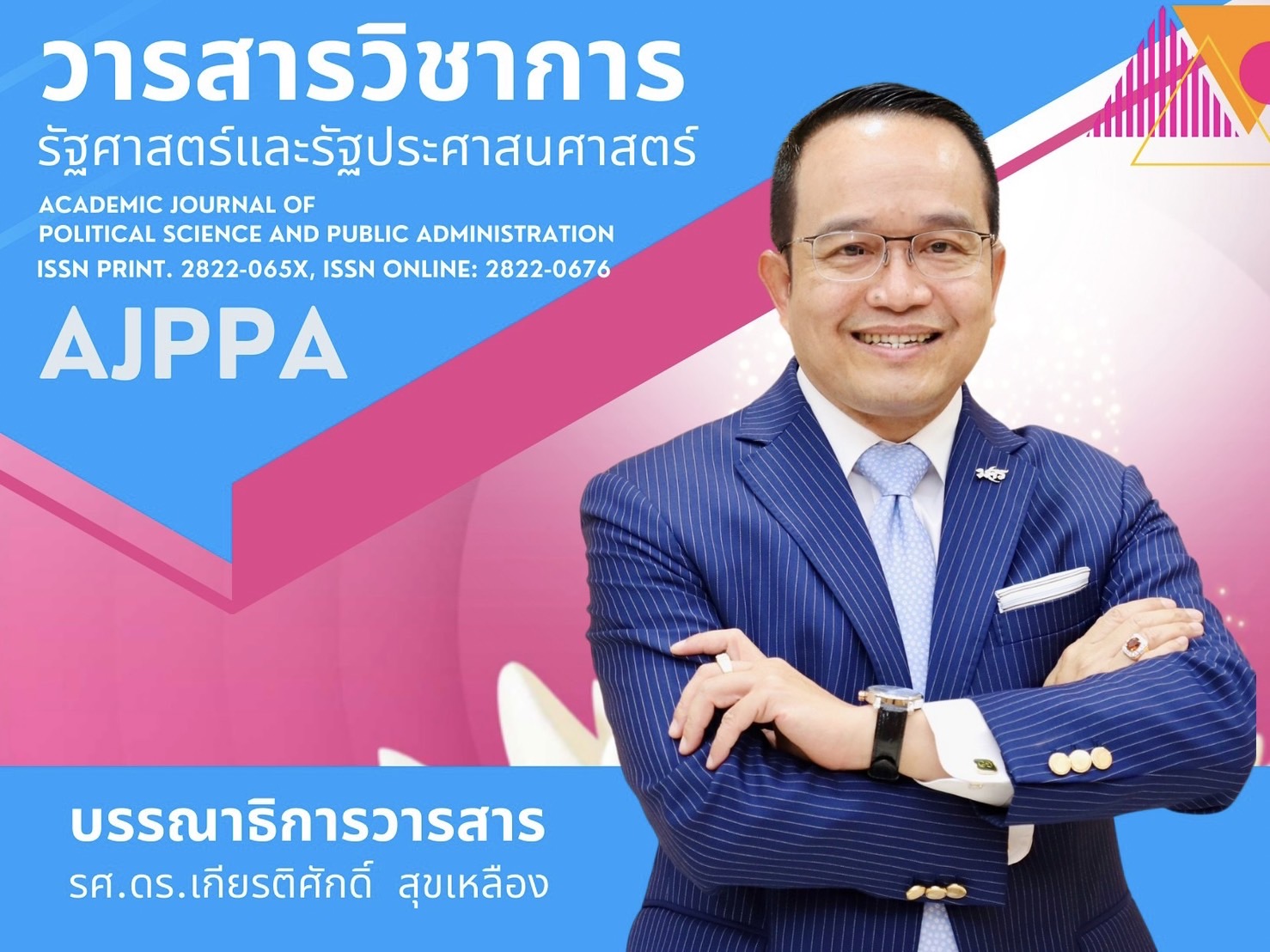การประยุกต์หลักพุทธธรรมเพื่อส่งเสริมความเป็นพลเมืองในระบอบประชาธิปไตยของเยาวชนในจังหวัดนครปฐม
คำสำคัญ:
หลักพุทธธรรม, พลเมือง, เยาวชนบทคัดย่อ
บทความวิจัยนี้มีวัตถุประสงค์เพื่อ 1. ศึกษาความเป็นพลเมือง 2. ศึกษาปัจจัยที่ส่งผลต่อความเป็นพลเมืองในระบอบประชาธิปไตย 3. ประยุกต์หลักพุทธธรรมเพื่อส่งเสริมความเป็นพลเมืองในระบอบประชาธิปไตยของเยาวชนในจังหวัดนครปฐม เป็นการวิจัยแบบผสานวิธี การวิจัยเชิงปริมาณ เก็บข้อมูลด้วยแบบสอบถาม ที่มีค่าความเชื่อมั่นทั้งฉบับเท่ากับ 0.891 ได้กลุ่มตัวอย่างจากสูตรของทาโร่ ยามาเน่ จำนวน 400 คน วิเคราะห์ข้อมูลโดยโปรแกรมสำเร็จรูป และการวิจัยเชิงคุณภาพ เก็บข้อมูลจากผู้ให้ข้อมูลสำคัญ 18 รูปหรือคน ได้แก่ นักวิชาการด้านพระพุทธศาสนา ด้านรัฐศาสตร์ตัวแทนภาครัฐ ผู้นำท้องที่ และเยาวชน โดยใช้การสัมภาษณ์แบบมีโครงสร้าง วิเคราะห์ข้อมูลด้วยเทคนิคการวิเคราะห์เชิงเนื้อหา
ผลการวิจัยพบว่า 1. ความเป็นพลเมืองในระบอบประชาธิปไตยของเยาวชนในจังหวัดนครปฐม โดยภาพรวมอยู่ในระดับมาก ( =4.02), 2. ปัจจัยการกล่อมเกลาทางการเมืองส่งผลต่อความเป็นพลเมืองในระบอบประชาธิปไตย สามารถร่วมกันทำนายความเป็นพลเมืองในระบอบประชาธิปไตยของเยาวชนในจังหวัดนครปฐม ได้ร้อยละ 87.1 และหลักสัปปุริสธรรม สามารถร่วมกันทำนายความเป็นพลเมืองในระบอบประชาธิปไตยของเยาวชนในจังหวัดนครปฐม ได้ร้อยละ 87.3 และ 3. การประยุกต์หลักพุทธธรรมเพื่อส่งเสริมความเป็นพลเมืองในระบอบประชาธิปไตยของเยาวชนในจังหวัดนครปฐม ส่งเสริมความเป็นพลเมืองในระบอบประชาธิปไตยของเยาวชนในจังหวัดนครปฐม ให้พลเมืองเรียนรู้สังคม รู้จักตนเอง เข้าใจคนอื่น ยอมรับการอยู่ร่วมกัน ไม่ละเมินสิทธิ คนอื่น เข้าใจการกระทำแห่งรัฐ เข้าใจตัวแทนหรือนักการเมืองและระบบการเมืองในสังคมไทย เข้าใจวัตถุประสงค์การบริหารประเทศ ระบบการปกครองต่าง ๆ ในการอยู่ร่วมกัน สร้างจิตสาธารณะ อาสาเพื่อส่วนรวม เสียสละบ้างบางโอกาส
เอกสารอ้างอิง
จรัส พยัคฑราชศักดิ์ และคณะ. (2559). คู่มือการสอนวิชาพระพุทธศาสนา ม. 3. กรุงเทพฯ: สำนักพิมพ์วัฒนาพานิช จำกัด.
จุฬีวรรณ เติมผล. (2559). เยาวชนกับการมีส่วนร่วมพัฒนาประชาธิปไตย. กรุงเทพฯ: สำนักการพิมพ์ สำนักงานเลขาธิการสภาผู้แทนราษฎร.
เชวงศักดิ์ เอี่ยมสำอาง. (2566). การส่งเสริมจิตสำนึกทางการเมืองแบบประชาธิปไตยของเยาวชนในสังกัดสำนักงานเขตพื้นที่การศึกษามัธยมศึกษาชลบุรี ระยอง (ดุษฎีนิพนธ์ปรัชญาดุษฎีบัณฑิต สาขาวิชารัฐศาสตร์). พระนครศรีอยุธยา: มหาวิทยาลัยมหาจุฬาลงกรณราชวิทยาลัย.
โชคชัย ศรีรักษา. (2566). การพัฒนาการส่งเสริมการปลูกฝังจิตสำนึกการเมืองการปกครองในระบอบประชาธิปไตยแก่เยาวชนจังหวัดลพบุรี (ดุษฎีนิพนธ์ปรัชญาดุษฎีบัณฑิต สาขาวิชารัฐศาสตร์). พระนครศรีอยุธยา: มหาวิทยาลัยมหาจุฬาลงกรณราชวิทยาลัย.
ธีรยุทธ ชะนิล. (2566). การประยุกต์หลักพุทธธรรมและการสื่อสารทางการเมืองของนักการเมืองเพื่อ สร้างความนิยมสำหรับการเลือกตั้งระดับท้องถิ่นในจังหวัดนครศรีธรรมราช (ดุษฎีนิพนธ์ปรัชญาดุษฎีบัณฑิต สาขาวิชารัฐศาสตร์). พระนครศรีอยุธยา: มหาวิทยาลัยมหาจุฬาลงกรณราชวิทยาลัย.
พระชาณรงค์ โชติธมฺโม (ประเสริฐศรี). (2566). การบูรณาการหลักพุทธธรรมเพื่อส่งเสริมความเป็นพลเมืองในระบอบประชาธิปไตยของเยาวชนในกรุงเทพมหานคร
(ดุษฎีนิพนธ์ปรัชญาดุษฎีบัณฑิต สาขาวิชารัฐศาสตร์). พระนครศรีอยุธยา: มหาวิทยาลัยมหาจุฬาลงกรณราชวิทยาลัย.
พระธรรมปิฎก (ป.อ.ปยุตฺโต). (2543). กระบวนการเรียนรู้เพื่อพัฒนาคนสู่ประชาธิปไตย. กรุงเทพฯ: สหธรรมิก.
วัชรินทร์ ชาญศิลปะ. (2561). ความเป็นพลเมืองของเยาวชนไทย. วารสารรัฐศาสตร์ปริทรรศน์ มหาวิทยาลัยเกษตรศาสตร์, 5(1), 187-209.
สำนกงานเลขาธิการสภาผู้แทนราษฎร. (2555). พลเมืองในระบอบประชาธิปไตย. กรุงเทพฯ: สำนักการพิมพ์ สำนักงานเลขาธิการสภาผู้แทนราษฎร.
สุทธญาณ์ โอบอ้อม. (2560). การเสริมสร้างจิตพฤษติกรรมการเป็นพลเมืองที่ดีในสังคมประชาธิปไตยของนักเรียนในจังหวัดนครปฐม (รายงานการวิจัย). พระนครศรีอยุธยา: มหาวิทยาลัยมหาจุฬาลงกรณราชวิทยาลัย.
สุวิทย์ เมษินทรีย์. (2556). โลกเปลี่ยนไทยปรับ. กรุงเทพฯ: กรุงเทพธุรกิจ.

ดาวน์โหลด
เผยแพร่แล้ว
รูปแบบการอ้างอิง
ฉบับ
ประเภทบทความ
หมวดหมู่
สัญญาอนุญาต
ลิขสิทธิ์ (c) 2024 วารสารวิชาการรัฐศาสตร์และรัฐประศาสนศาสตร์

อนุญาตภายใต้เงื่อนไข Creative Commons Attribution-NonCommercial-NoDerivatives 4.0 International License.




